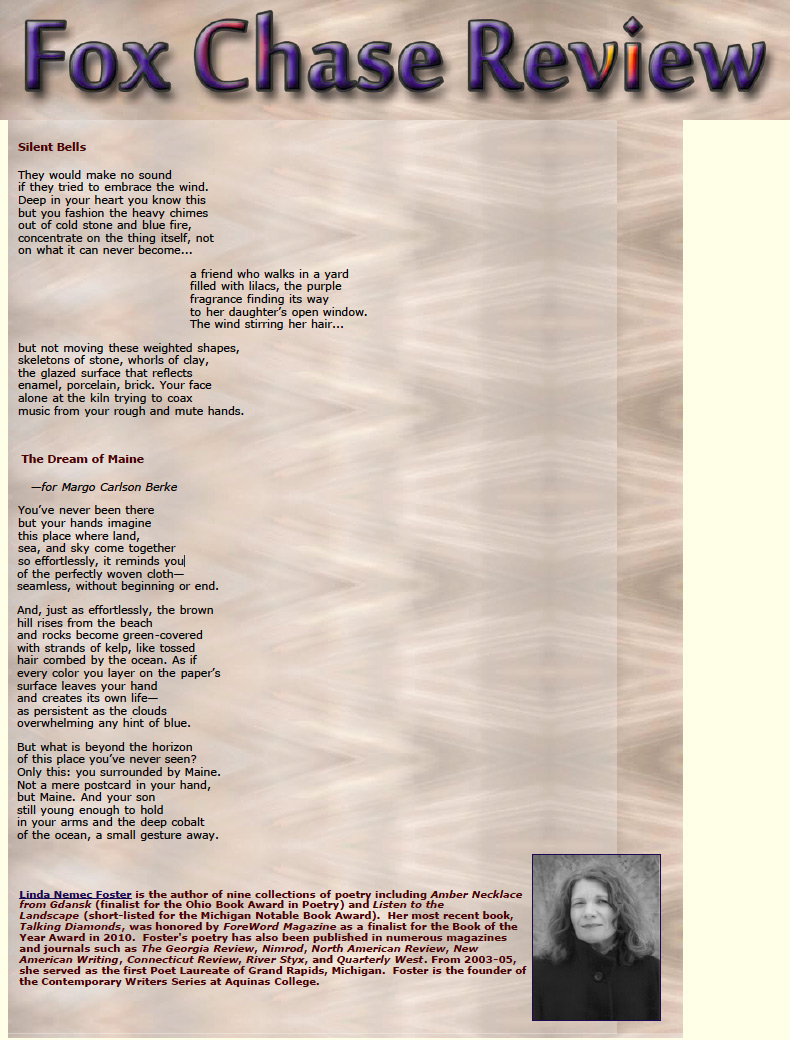(Cervena Barva Press, W. Somerville, MA, 2008)
Linda Nemec Foster is an American poet of Polish ancestry, who has published nine collections of poetry and lives in Michigan. Ten Songs From Bulgaria (2008) is her eighth collection, a chapbook with poems inspired by Bulgarian artist Jacko Vassilev’s black and white photography from the (post-)communist epoch(s) and which inspired Hungarian folk musician Laszlo Slomovits to compose a CD, Cry of Freedom.
Each of the ten ekphrastic poems included in the collection has ten lines and each line has about ten syllables. In them, the poet makes use of the power of the enjambment, moderate repetition and sometimes counterpoint, with the purpose of presenting a reality from elsewhere and the play between past and present, imagination and reality. Several names (Vladimir, Cristo, Stoian and Zlatio Zlatev), the symbol of the dancing bear, the reference to the Balkans and Eastern Europe highlight a geo-cultural framework specific to Bulgaria.
As well as Jacko Vassilev’s dramatic photos, Linda Nemec Foster’s poems depict people “banished from the Garden of Eden”, who find other types of Eden in surreal artistic faith and unusual music and dance. In line with Vassilev’s photos, which illustrate the life of the poor during communism and immediately after, the poems too echo aspects related to the lives of the unfortunate. Inspired by the photographer’s compassion, the poet weaves multivalent stories around moving static pictures and, in contrast with the pictorial project, she sometimes makes the personages speak their own minds. The characters of these poems vary from “he” or “she” to “they”, which conveys a sense of detachment and contemplation, or they are written in the first person singular and sometimes the “I” is combined with “they”, “you” or “she”, which transmits empathy and involvement with a “world as tangible as fog”.
One of the most powerful texts in the book is “The Dancing Bear”, written as a persona poem in which the first person singular is the chained bear, a symbol of tamed nature that breaks its chains of speechlessness by starting to address the onlookers:
Once upon a time, I did not exist
in this frozen pose. Only danced
in your dreams like a myth:
bear of elegant waltz and measured
fox-trot; bear of passionate tango
and manic jitterbug. Now look at me.
Reduced to a muzzle and chain, serenaded
by a fool with a clumsy violin. I refuse
to dance, cannot remember the basic steps.
Music of the forest stuck in my throat.
The poem starts as a fairytale – and there are many of them with and about bears in the world – but ends as a story closer to contemporary man’s attitude to otherness, be it human, animal, natural, cultural etc. The point of dramatic change placed in the middle, “Now look at me”, signifies a boundary between myth and reality, a door between expectations and fact, between a certain cultural label and truth. It questions the artist’s gaze in a world in which we all watch and are watched and in which those portrayed can more easily talk back. The initial contrast – “I did not exist” / “Only danced” – alludes to the Western imagination of the Orient and is reinterpreted in the second part of the poem as absence, whose phenomenology is subtly instrumented with the verb “to refuse”, the negation “cannot remember” and the adjective “stuck”. “I refuse / to dance” may stand for a response against stereotypes. Dance does not mean only waltz, fox-trot, tango or jitterbug, all of them related to the urban European and American cultures. The title of the poem reminds us of rural areas and crossroads. Moreover, dancing as a form of body art is indirectly contrasted with the art of writing as opposed to singing or speaking.
The poem is interesting from a gender perspective too. Hunting in general and hunting bears in particular have traditionally been associated with men and their relationship to nature. What Linda Nemec Foster proposes here is a feminine or queer perspective on the same relationship, given that a persona poem implies a mask. Although there is no word in the text which might suggest the bear is anything other than masculine, the fact that the poem was written by a woman casts an intriguing light. What if the dancing bear is a she-bear? Does it make any difference? Of course it does. If chaining and muzzling a she-bear means there will be no more baby bears, then the poem offers a distinct feminine or queer view on understanding and performing wilderness. The empathetic personification suits the object and subject play, in the sense that it projects a dialogic attitude to otherness. Moreover, the underlying meaning of the word “bear” as a verb and its idiomatic expressions suggest a whole complex universe in itself.
The poem also speaks about America and its wilderness, by alluding to the mythical bear portrayed by William Faulkner. It represents a return to nature, as both environmental and human, and a possible internalization of the old Ben (from The Bear, a short story included in the collection Go Down Moses) as a cultural symbol of freedom and untamed nature, here transposed in an Eastern European geographical location. Giving voice to a bear also hints at the contemporary futility of giving voice to others, when, in fact, they came equipped with a voice, but the inability of others to hear them often translates as deliberate silencing. In the bear’s refusal to dance or to sing, the poet represents a reality waiting to be discovered.
*****
Monica Manolachi is a lecturer at the University of Bucharest, where she teaches English in the Department of Modern Languages and where she completed her doctoral thesis, Performative Identities in Contemporary Caribbean British Poetry, in 2011. Her research interests are American, British and Caribbean literature and culture, postcolonial studies and contemporary Romanian and Eastern European literature in translation. As a poet, she has published two collections in Romanian and was awarded a prize for poetic eloquence by the American Cultural Center in April 2005. She is also a translator and editor, contributing to the multilingual literary magazine Contemporary Literary Horizon.
Originally Published by Galatea Resurrection 25, click here to view article.



